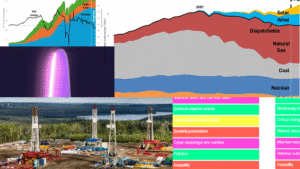Description
In this Frankly, Nate describes the Carbon Pulse – a one time massive consumption of fossil hydrocarbons at a pace millions of times faster than they were created. He outlines the many shapes that this pulse could take, as well as some shapes it will never take. Compared to previous carbon pulses that led to mass and minor extinctions, how does the modern pulse compare? What can what we know about ecology and human behavior tell us about the most likely paths into descent? Can thinking about these graphs on such grand geologic time scales help guide us away from the Precipice and towards a more Sapient Future?
In French, we have a motto that says that a simple drawing is often better than a long explanation. Jean-Marc Jancovici Carbone 4 President
That’s very understandable because with left atmosphere thinking, one of the problems is that you see everything as a series of problems that must have solutions. Iain McGilchrist Neuroscientist and Philosopher
We can’t have hundreds and hundreds of real relationships that are healthy because that requires time and effort and full attention and awareness of being in real relationship and conversation with the other human. Nate Hagens Director of ISEOF
This is the crux of the whole problem. Individual parts of nature are more valuable than the biocomplexity of nature. Thomas Crowther Founder Restor
Show Notes & Links to Learn More
00:00 – Graphs Shown in this Frankly
00:23 – The Great Simplification Animated Movie
00:25 – The Carbon Pulse
02:49 – Previous Extinction Events
03:55 – We are releasing carbon way faster compared to previous mass extinctions
04:50 – Normal Curve
05:24 – This carbon will never exist again on human time scales
07:34 – Debt allows us to use more energy from the future today
08:39 – S-Curve
15:51 – Ken Deffeyes – Peak oil
17:44 – Ice Ages
19:33 – Fossil Fuel Scenarios







